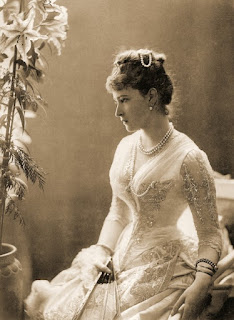On the occasion of the centenary of the anniversary of the martyrdom of Elizaveta, Grand Duchess of Russia
Matthew 11.25-27
 Today
we remember Elizaveta Feodorovna, the wife of Grand Duke Sergei, the sister of
Empress Alexandria and relative of Prince Philip. It is the centenary of the
anniversary of her murder by the Bolsheviks.
Today
we remember Elizaveta Feodorovna, the wife of Grand Duke Sergei, the sister of
Empress Alexandria and relative of Prince Philip. It is the centenary of the
anniversary of her murder by the Bolsheviks.
There
is no place for pride in our Christian faith.
With
God it does not matter if this world considers us ‘wise’.
With
God it does not matter if you have human power.
Indeed
human wisdom and power seem to be a problem.
Paul
writes how God chooses the weak and foolish of this world rather than the wise
and the strong.
The
wise think that they can find salvation through wisdom or knowledge.
The
strong think that they can find salvation through their strength.
But
those who recognise that they are weak and foolish know that they cannot rely
on wisdom or strength and so have to turn to God.
 Today
we remember Elizaveta Feodorovna, the wife of Grand Duke Sergei, the sister of
Empress Alexandria and relative of Prince Philip. It is the centenary of the
anniversary of her murder by the Bolsheviks.
Today
we remember Elizaveta Feodorovna, the wife of Grand Duke Sergei, the sister of
Empress Alexandria and relative of Prince Philip. It is the centenary of the
anniversary of her murder by the Bolsheviks.
She
certainly was born into all those things that the wisdom of this world says are
important: privilege, beauty, power and wealth. But from her childhood, through the
influence of a godly mother, she realised that there are other things that are
far more important.
And
after the assassination of her husband in 1905, she gave up her privilege,
power and wealth.
She
went to visit her husband’s murderer,
forgave him, begged him to repent and even interceded (unsuccessfully) for him
to be pardoned.
She
sold her jewels and spent her money on founding a
convent, hospital and orphanage.
That
convent was re-established in the early 1990s, and now serves both as a place
of prayer and as an orphanage for children with cerebral palsy, and a respite
centre for children who are critically ill. We went there with the Archbishop
of Canterbury last November.
And
Elizaveta became a nun,
living the life of a nun, wearing the habit of a nun, devoting herself to
prayer and working tirelessly - along with the other nuns - among the sick and
poor of Moscow. She tried to set up an order of Orthodox deaconesses which
combined both prayer and action. That came to nothing.
And
she became a martyr.
After
the revolution, Lenin ordered the Chekha to arrest her: he is quoted as saying:
‘virtue with the crown on it is a greater enemy to the world revolution than a
hundred tyrant tsars’.
And
so, 100 years ago, on July 18, 1918 she was executed - beaten then thrown into
a disused iron mine, 20 metres deep, together with other relatives of the royal
family. Some survived the fall, and the soldiers (and we have a first hand
account) heard them singing an Orthodox hymn. So they threw in hand grenades
and then burning firewood. Elizaveta survived both of those, and died either of
starvation or from her injuries. In October 1918, when the territory was taken
by White army soldiers, the remains of their bodies were discovered. And
Elizaveta had, even at the very end, found strength to bandage the head of
one of her dying companions with her wimple.
By
no account, could it be said that Elizaveta was one of the foolish or weak of
this world.
Even
as a nun she remained a Grand Duchess.
But
she used her wealth and her status - not for herself, not to have a comfortable
life, not even to save herself at the end. Because of her status she had two
opportunities to leave Russia after the revolution. Instead she used it to
support churches, monasteries and charitable works.
But
her story shows us that it is possible to have status, to be powerful and
intellectually gifted and to know that is not about status and power and
wealth. It is about a complete dependence on God, a knowledge of God that is a
gift of God, and a knowledge that leads to love of God, and a love of God which
enables us to love people in Jesus’ name.
Jesus
said, ‘I thank you, Father, Lord of heaven and earth, because you have hidden
these things from the wise and the intelligent and have revealed them to
infants; yes, Father, for such was your gracious will’ (Matthew 11.25-26).
There
is a story of how, on one occasion, Elizaveta went to visit a orphanage for
girls. The children were taught how they should greet her and were told that
they were to curtesy and kiss her hand. But when she turned up, the little
girls got confused and stretched out their hands to the Grand Duchess saying,
‘Kissing of hands’. Their teachers were horrified. But the Grand Duchess, with
tears in her eyes, came up to the girls, bent down, and kissed the hands of
each of them.


Comments
Post a Comment